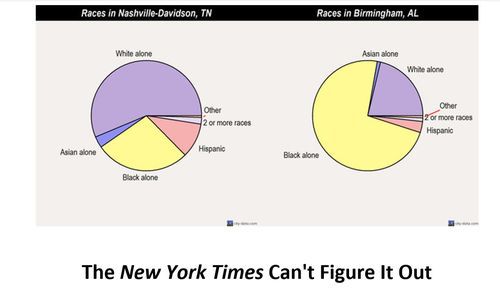


By Steve Sailer
12/17/2018
From The New York Times:
Nashville’s Star Rises as Midsize Cities Break Into Winners and Losers
Nashville and others are thriving thanks to a mix of luck, astute political choices and well-timed investments, while cities like Birmingham, Ala., fall behind.
By Ben Casselman, Dec. 16, 2018
NASHVILLE — Forty years ago, Nashville and Birmingham, Ala., were peers. Two hundred miles apart, the cities anchored metropolitan areas of just under one million people each and had a similar number of jobs paying similar wages.
Not anymore. The population of the Nashville area has roughly doubled, and young people have flocked there, drawn by high-paying jobs as much as its hip “Music City” reputation.
Last month, the city won an important consolation prize in the competition for Amazon’s second headquarters: an operations center that will eventually employ 5,000 people at salaries averaging $150,000 a year.
Birmingham, by comparison, has steadily lost population, and while its suburbs have expanded, their growth has lagged the Nashville area’s. Once-narrow gaps in education and income have widened, and important employers like SouthTrust and Saks have moved their headquarters. Birmingham tried to lure Amazon, too, but all it is getting from the online retail giant is a warehouse and a distribution center where many jobs will pay about $15 an hour.
Amazon’s announcement has been widely described as a rich-get-richer victory of coastal “superstar cities” like New York and Washington, regions where the company plans to employ a total of at least 50,000 workers. But the company’s decisions also reflect another trend: growing inequality among midsize cities.
The article doesn’t mention, however, that Birmingham is a lot blacker (71.6%) than Nashville (28.1%). The metro areas aren’t as different, but those are big differences in the city itself, kind of like Detroit vs. Pittsburgh.
The NYT’s list of second tier cities that are doing well, like Nashville, tend to be whiter than cities that aren’t doing well: e.g., Columbus vs. Cleveland.
The real incendiary question is whether there is an inflection point: if blacks have a big enough share of the population that they take control of the city government, as in Detroit, Gary, East St. Louis, New Orleans, Baltimore, and Birmingham, does the city tend to go into a tailspin? Birmingham, for instance, has had only black mayors since 1979. Baltimore, in contrast, had a white mayor (Martin O’Malley) as recently as 2007.
Some cities go so far down, like Detroit and New Orleans, that they wind up with white mayors again.
Atlanta, while it has problems, is kind of an encouraging exception. My impression is that Atlanta has long had a black middle class and its political class has a pretty good awareness of how much it can squeeze the corporate golden goose without killing it. (E.g., the black political operators in Tom Wolfe’s Atlanta opus A Man In Full are, on the whole, fairly impressive.)